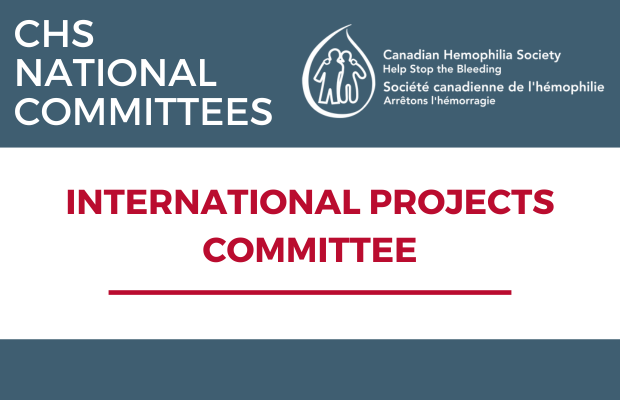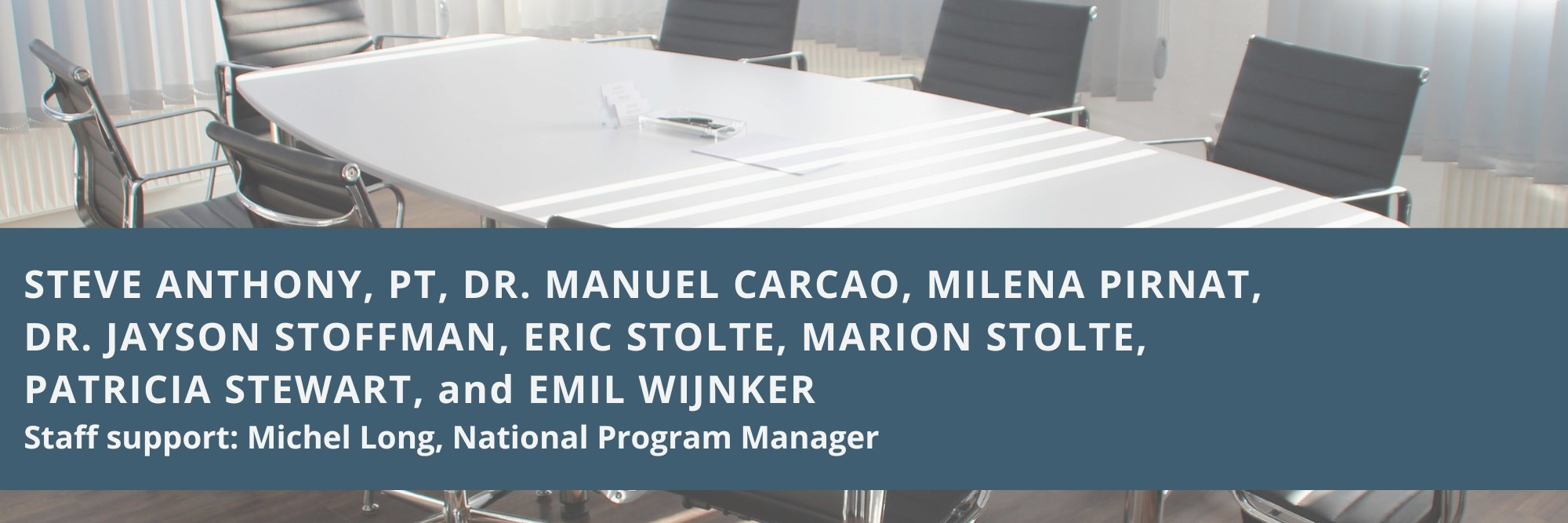The value in sharing our strengths

PREAMBLE
In our special series of articles on the numerous committees our volunteers sit on, it is our pleasure to now present you the International Projects Committee.
INTERNATIONAL PROJECTS COMMITTEE
The purpose of the International Projects Committee is to provide support and guidance to the CHS chapters and treatment centres engaged or wishing to become involved in twinning projects aimed at enhancing organizational capacity and supporting bleeding disorder care care in emerging countries. Given that the CHS has a fund to financially support such initiatives, the committee shall evaluate proposals and recommend funding for twinning projects submitted by the CHS, its chapters and treatment centres that satisfactorily meet the application criteria as set by the committee. These twinning projects must be previously approved by the World Federation of Hemophilia (WFH), approved annually by the CHS, the provincial chapter or the clinic director and may be supported financially or otherwise by the committee beyond their WFH closing date in order to ensure a smooth transition to a sustainable model of bleeding disorder care.
The responsibilities of the committee are to:
- Act as a resource, provide advice, consultation and help (where feasible and appropriate) to the CHS, interested or committed CHS chapters and Canadian bleeding disorder treatment centres to facilitate their initiation and development of bleeding disorder care related international projects approved by the WFH.
- Act as a resource and offer support to existing twins encountering difficulties and facing common issues and challenges.
- Facilitate learning of the CHS twinning representatives by offering training, information sessions, resource materials and tools on such subjects as working cross-culturally, proposal writing, budget development, planning and tracking, problem solving in a culturally sensitive manner, working with foreign and Canadian diplomatic missions, successfully preparing for, experiencing and returning from an international visit, etc.
- Encourage the sharing of best practices and lessons learned between Canadian twinning representatives.
- Act in a collaborative manner with the WFH and the regional staff person or volunteer for existing and potential CHS twinning partnerships.
- Act as a liaison between the WFH, the CHS, its chapters and Canadian bleeding disorder treatment centres as needed and facilitate the sharing of information (action plans, progress and final reports, etc.).
- Prepare an application form, application criteria and reporting expectations to be distributed within the Canadian bleeding disorder community with respect to the CHS International Projects Fund.
- Review applications as they are received.
- Select appropriate programs and projects in order to disburse our funds in a timely manner. (committee members deemed to be in conflict interest must abstain from voting).
- Follow-up and monitor funded projects: review progress reports and make corrective recommendations as required.
- Review projects final reports. Evaluate outcomes of projects based on initial expected results. Provide twins with the committees’ appreciation.
- Treat and distribute, as deemed appropriate, information, requests for information and twinning opportunities requests received from the national or international community.
- Establish, through an annual performance plan, the yearly activities of the committee.
The committee is composed of not fewer than five and not more than ten members who are appointed by the chairperson. Members have special interests or relevant experience in international projects. Ideally, in choosing members, consideration is also given to geographical representation and includes one Canadian member representative from all active bleeding disorder organizational twinning (HOT) and bleeding disorder treatment centre twinning. If needed, the committee can also choose to recruit members from outside of the bleeding disorder community.
The term of appointment for members is one year, renewable.
Current members of the International Projects Committee are:

Working on the International Projects Committee is particularly meaningful since those of us in countries who have so much with regard to care have a responsibility to those in our global bleeding disorder community to contribute to seeing care and treatment increase for those who have so much less than we do.
I’ve always been of the conviction that we in Canada have so much, we should share our strength with the 75% of people with hemophilia who have little or no access to care. This was one place where the need of our global bleeding disorder community intersected with our Canadian work.
Volunteering on this committee, I simply lend my energy and insight to the work of the committee.
The International Projects Committee connects us in Canada to the wider world of our bleeding disorder community and helps us 1) lend our strength to the work of our global community and 2) let’s Canadians see how much they have and how important it is to maintain vigilance and energy in preserving what we have and making care even better. Canadians can see first hand the negative impact of neglecting our own situation as we see the effects a lack of care has on others.
In each of the twinning requests that we’ve been able to strengthen through the support of the International Projects Committee, we have achieved better outcomes and stronger twinning partnerships. To me, there is not one “achievement” that stands out. It’s the collective achievements, as modest as they may be, that impact the people about whom we care from our global community.
What would I say to someone who would be interested in joining the International Projects Committee? Please do! Your work and effort in serving brings the personal reward of knowing that you’ve made life better for someone who doesn’t have the privilege we have of socialized medical care. You enable the CHS to maintain an outward focus that can only strengthen our resolve to improve and care for people here at home as well. – ERIC STOLTE
I believe we have a responsibility to the global community – the world at large – and joining the International Projects Committee seemed as though it was one way I could have an opportunity to learn from others who had been on it and participated in various international projects and find a way to contribute to it as well.
I trust I brought enthusiasm, willingness to listen to various perspectives from the CHS chapters and to those within the medical community. It was a privilege to chair the International Projects Committee for several years and to work with so many committed volunteers, some of whom have been part of its beginning, many years ago. Each one and each project opens our eyes – it certainly opened mine – to the needs and opportunities to be explored in countries around the world. I hope I helped us all ensure we stayed focused and found ways to creatively help one another out.
This committee has endeavoured to keep awareness of global issues in front of us as Canadians. Often we can stay in our own world and forget that elsewhere bleeding disorder care is not what we have. So it allows us to see what great advances we have and to encourage involvement to see that happen globally.
The International Projects Committee created a number of resources to help those who wished to engage with other countries. And those are available for anyone, at any time – whether in Canada or abroad – to use.
I believe that keeping the CHS community aware – by its title “International” – of our role and responsibility in the global bleeding disorder community, is the greatest achievement of the International Projects Committee.
If you have an interest in, or are curious about, the bleeding disorder world at large, then this is a wonderful place to begin a journey of discovery. It’s an opportunity to see what has been done, what is being done through CHS chapters and volunteers. Some of the work is mundane, for sure, but keeping the vision and mission alive and at the forefront will provide the impetus to serve well – for a greater good than our own. – MARION STOLTE




